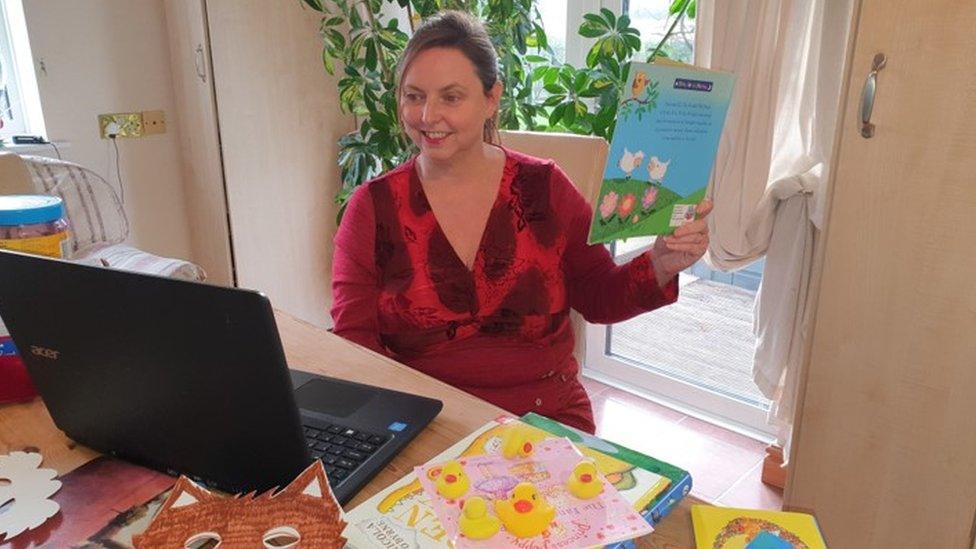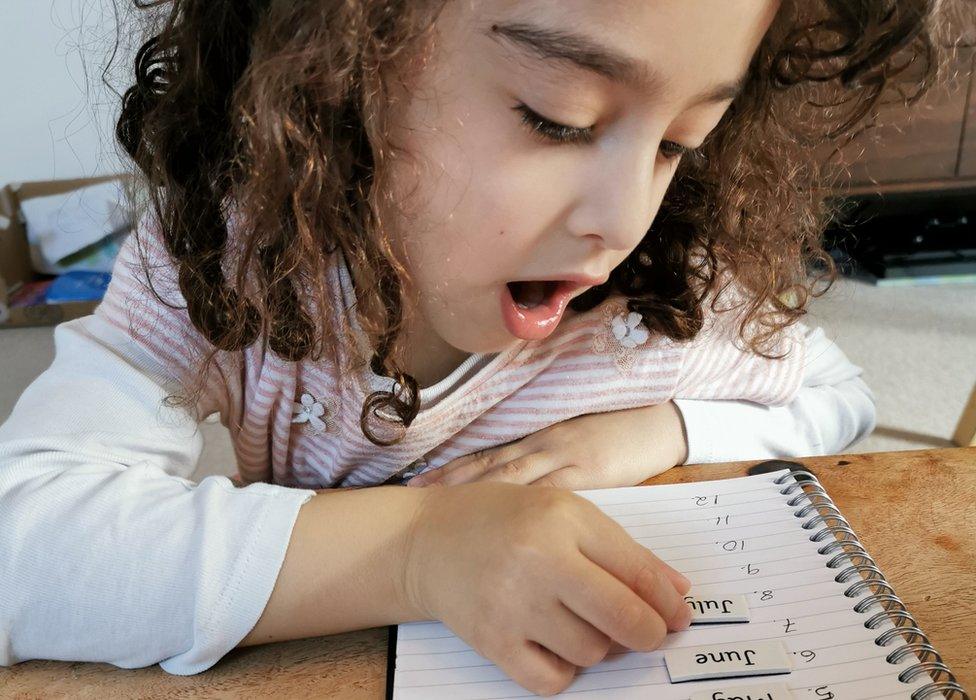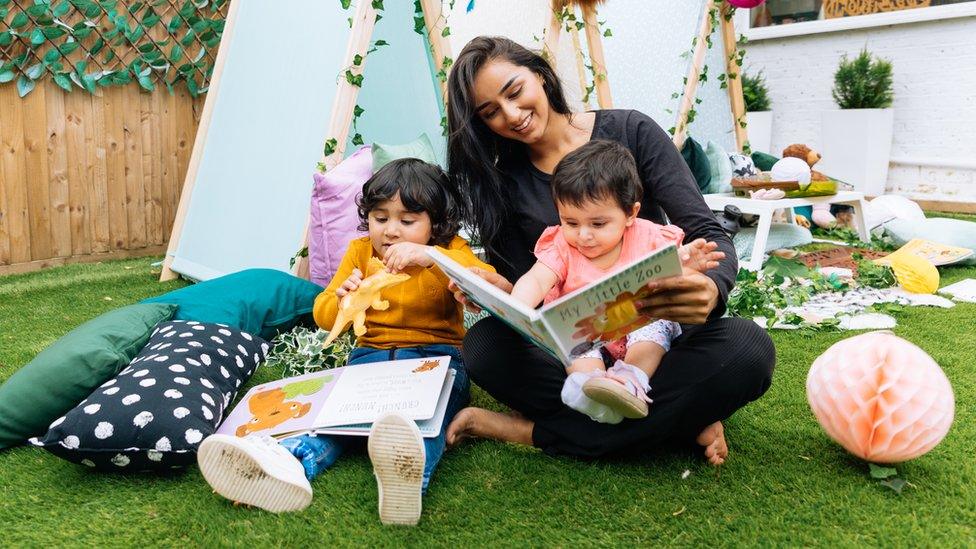Would you trust a 'virtual nanny' with your kids?
- Published

Virtual nanny Antoinette Wood says she plans the lessons very carefully
As many parents have struggled with childcare issues during the pandemic, a number of tech firms have been offering solutions.
Richard Conway says that many people were not convinced by his idea for "virtual nannies" - whereby the childminder is on the other end of a Zoom call.
"A lot of people thought it was a crazy idea, and that it involved leaving the child home alone," says the founder of Childcare.co.uk.
Instead the service is designed so that mum or dad can get some work done at home, while someone else, via a computer screen, keeps the kids occupied. The child must be aged at least two for parents to use the service.
"Younger children need a bit of entertainment, and if parents are working they can't always give them the time they need," adds Mr Conway. "So we thought having a virtual nanny, who is a real nanny, by video would be a great solution."
Earlier this year, Thea Herodotou, 37, a senior lecturer in London, arranged for a virtual nanny to look after her daughter Zoe, aged five.

Thea Herodotou says that her daughter Zoe, pictured, took a few sessions to get used to her virtual childminder
With Zoe's nursery closed during the first lockdown, Thea says it was "unmanageable" juggling parenting and working from home.
"My husband and I would take frequent breaks with Zoe, and entertain her, but it was stressful."
So they booked Antoinette Wood, an Ofsted registered professional nanny, for an hour a day.
It took Zoe a few sessions to settle, says Thea. "My daughter would run out of the room [to begin with]. However, Zoe slowly got used to the daily session and I was able to leave them in the room."
Antoinette says the sessions work if they are "carried out for an hour at a time, especially as young children have short attention spans".
"I am a great planner, so I prepared a lesson plan of how Zoe and I would spend our virtual hour together each day," she says. "I also sent her a list of items such as paper, pencils, crayons, scissors, dice and a drink of water that she would need during this hour.
"The hour session consists of a little hello and chat, story time, singing rhymes and counting, games, music and movement. The hour is led by the child, and each day we finish our session with dancing around the living room to a well-known song."


New Tech Economy is a series exploring how technological innovation is set to shape the new emerging economic landscape.

Richard Conway says there are now more than 4,000 virtual nannies available via his website, and that more than 50,000 parents have made enquiries about the service.
However, it is safe to say that the idea of someone looking after your kids from the other end of a video call will not be for every mum and dad.
Parenting expert Sarah Ockwell-Smith, author of The Gentle Parenting Book, says it is not a substitute for in-person human interaction.
"Children in particular really struggle with living life through a screen," she says. "The separation from friends and relatives, who they would normally see often, but can now only view through a screen, and moving all social interaction and classes online, I think has created a bit of a ticking time bomb.
"This isn't how we are meant to live, and I do think we are going to see a lasting impact on this generation of children as they grow up."
For parents who want a babysitter who will be physically present, there are apps such as Bubble, which has more than 20,000 on its books.
Ranging from students to nannies, each has to go through a verification process. This includes identity and reference confirmations, and a DBS (Disclosure and Barring Service) check, which sees if a person has a criminal record.
Each individual signed up is then also reviewed by parents.
Mum Sri Nujella used the app back in March to book a 19-year-old student to look after her daughter Ishi, who is three.

Sri Nujella says that she really needed to find convenient childcare for her daughter Ishi
A project manager, Sri says she needed help because she was just three days into a new job when Ishi's nursery had to close. At the same time, her husband was away in India with work.
"My job demanded a lot of attention," she says. "I was desperate to find childcare."
So she used Bubble to book cover for half a day, Monday to Friday, for a month.
Ari Last, the chief executive of Bubble, says there has been a big change in how the service has been used this year.
"Pre-Covid, parents were booking babysitters for evenings, but now that's been replaced by daytime. Working from home with kids is impossible, and parents are using Bubble for when they have an important video conference, or just to watch their kids while they work."
Another tech firm trying to increase childcare options is website and app Tiney.
The platform allows people to train to become childminders and set up nurseries in their own homes. They receive advice on how to run their business, including support regarding insurance, payments, lesson plans, health and safety, and communication with parents.

Tiney helps childminders set up nurseries in their homes
Tiney says it has had 7,000 applications from people wanting to retrain as childminders since the start of the first nationwide lockdown. These include people who have lost their jobs as a result of the pandemic, and former teachers and nursery staff who want to run their own businesses.
When a parent pays for a childcare place via the app, Tiney keeps 10% of those funds. Childminders have to stay with the company for a minimum of two years.
"There is a massive shortage of childcare," says Tiney boss Brett Wigdortz, who also founded educational charity Teach First, which aims to help improve the school performance of students from low-income backgrounds.
"The whole childcare sector isn't working now. We're trying to make childminding run like a nursery, with simple contracts and invoices through the app."
Mr Wigdortz adds, to the hopeful ear of many stressed-out parents: "Technology makes everyone's life easier."